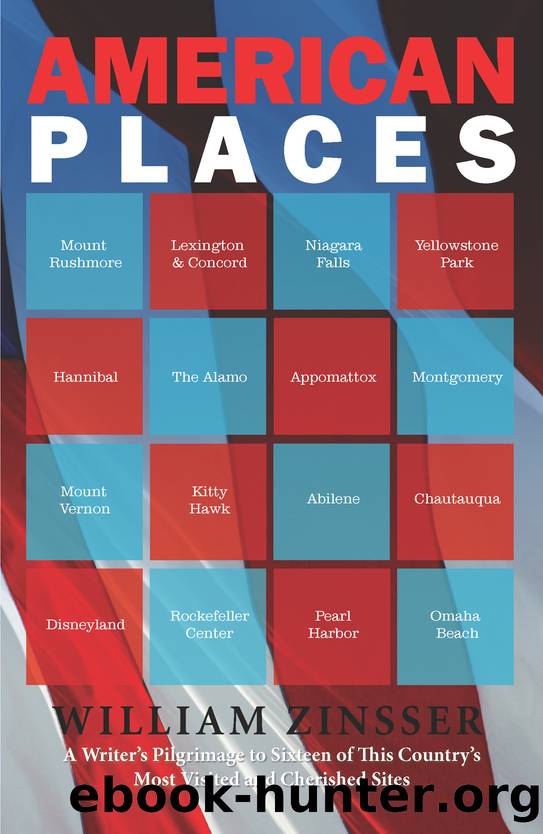American Places: A Writer's Pilgrimage to Sixteen of This Country's Most Visited and Cherished Sites by William Zinsser

Author:William Zinsser [Zinsser, William]
Language: eng
Format: epub
Tags: history, General, Travel, Essays & Travelogues, United States
ISBN: 9781589880344
Google: Y0SKSVi9cX8C
Publisher: Paul Dry Books
Published: 2007-11-15T23:43:37.530700+00:00
9. Mount Vernon
The Civil War I saw ending at Appomattox and the residual hatred of blacks I saw reflected in Maya Linâs tabletop at Montgomery took me into the darkest side of the American story. I also continued to be nagged by the dark myth of the Alamo and to find it troubling. On the simple level of frontier patriotism I was glad enough to salute the courage of 189 men who chose to die for the idea of freedom. But as a macho exercise sanctified into a symbol of American strength it was an early portent, I felt, of the strain of violence that would come to contaminate American life in the decades after World War IIâour leaders assassinated, our people routinely shot in the streetsâand of a foreign policy based on imperial bluster, love of weapons, military adventurism and enemy-bashing. I hated the trail of American death that circles the world from Central America to Vietnam to Iraq.
Suddenly I felt the need for an older myth, a purifying myth, a founding myth. I needed to go back to George Washington. I needed to go to Mount Vernon, Washingtonâs home on the Potomac River in Virginia, 17 miles south of the capital city that carries his name. I had last seen him on Mount Rushmore, radiating assurance, even in stone. Gutzon Borglum, whose own hero was Abraham Lincoln and who named his son Lincoln, nevertheless knew what billing and what visage to give the four Presidents. Jefferson and Theodore Roosevelt both face inward, one looking contemplative, the other stern, and Lincoln, looking grave, gazes down. But Washington is first among equals, out in front of his fellow Presidents and slightly removed from themâa godâand he looks out across the nation, confident and untroubled. He even seems to have a faint smile.
But who was this god?
Of all the iconic places in America, none has been visited by tourists for so long or with such worshipful curiosity as Mount Vernon. Proof of that factâwhich I learned soon after I got thereâwas that on the afternoon of July 31, 1797, Washington told his secretary, Tobias Lear, âUnless someone pops in, unexpectedly, Mrs. Washington and myself will do what I believe has not been [done] within the last twenty years by us, that is to set down to dinner by ourselves.â
Washington acquired Mount Vernon in 1754 and died and was buried there in 1799. His 45-year residence was interrupted by two eight-year periods when he was famously absent: as commander in chief of the Continental Army, which won the Revolutionary War, from 1775 to 1783, and as the countryâs first President, from 1789 to 1797. The godlike aura that those two roles conferred on him turned his home into a shrine well within his lifetime. He once compared Mount Vernon to âa well-resorted tavern,â noting that âscarcely any strangers who are going from north to south or from south to north do not spend a day or two at it.â
What attracted all those strangers was not only George Washington as the most exalted of American heroes.
Download
This site does not store any files on its server. We only index and link to content provided by other sites. Please contact the content providers to delete copyright contents if any and email us, we'll remove relevant links or contents immediately.
| Africa | Americas |
| Arctic & Antarctica | Asia |
| Australia & Oceania | Europe |
| Middle East | Russia |
| United States | World |
| Ancient Civilizations | Military |
| Historical Study & Educational Resources |
Machine Learning at Scale with H2O by Gregory Keys | David Whiting(4296)
Never by Ken Follett(3937)
Fairy Tale by Stephen King(3370)
Oathbringer (The Stormlight Archive, Book 3) by Brandon Sanderson(3161)
The Man Who Died Twice by Richard Osman(3072)
Will by Will Smith(2911)
Rationality by Steven Pinker(2352)
Can't Hurt Me: Master Your Mind and Defy the Odds - Clean Edition by David Goggins(2324)
The Dark Hours by Michael Connelly(2300)
Friends, Lovers, and the Big Terrible Thing by Matthew Perry(2219)
The Dawn of Everything: A New History of Humanity by David Graeber & David Wengrow(2197)
Principles for Dealing With the Changing World Order: Why Nations Succeed and Fail by Ray Dalio(2043)
A Short History of War by Jeremy Black(1843)
HBR's 10 Must Reads 2022 by Harvard Business Review(1840)
Go Tell the Bees That I Am Gone by Diana Gabaldon(1754)
A Game of Thrones (The Illustrated Edition) by George R. R. Martin(1726)
Kingdom of Ash by Maas Sarah J(1668)
515945210 by Unknown(1662)
443319537 by Unknown(1546)
